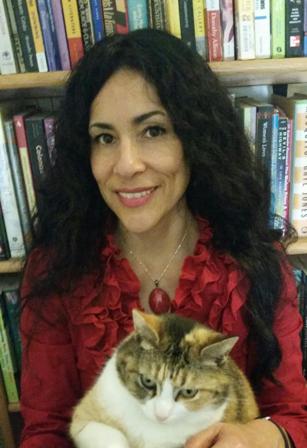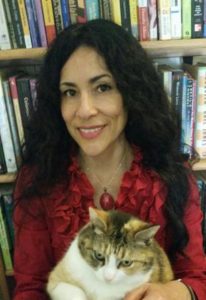
by David Lau
Victoria Bañales has taught at Cabrillo since 2005, the year she finished her doctorate in Literature at UC Santa Cruz. In addition to her doctorate, she holds degrees from UC Santa Barbara and San Francisco State. She is a distinguished colleague in the English Department and is known for her important work in the ACE and Summer Migrant Programs. She is also known as a strong faculty advocate for Latinx and other underrepresented students across campus and in the community.
In the period since the fall elections Dr. Bañales has been an important voice for undocumented students as the co-convener of the Cabrillo Hispanic Affairs Council. The mission of CHAC has taken on new importance in the Trump era. Her strong advocacy for students and for social justice is a reminder of the political importance of our educational work at Cabrillo.
Over email, we discussed her teaching award and her work with EOPS in the Summer Migrant Program; the situation for immigrant students on campus and the Watsonville Center; and her research background.
- David Lau: What does the EOPS Instructor of the Year award for 2016-2017 mean to you? Could you say something about your teaching in learning communities and things that you love about students?
Victoria Bañales: I was very honored and humbled to find out I was selected for the 2016-2017 EOPS Instructor of the Year Award, most especially because nominations for this award are all student-based. Being recognized by EOPS students means the world to me. I care tremendously about the success of EOPS, Latinx, returning, and other underrepresented students. I see how hard these students work despite having to deal with the everyday challenges of poverty, racial and gender discrimination, homophobia, and more. The lives of underrepresented students are very complex, and I am thrilled Cabrillo has programs like EOPS and learning communities that directly support these students. I, myself, have been teaching in two learning communities—the EOPS Summer Migrant Program (SMP) and the Academic for College Excellence (ACE) program—since 2007 and 2009, respectively. Because learning communities create deep intimate relationships between students and instructors, I know the myriad struggles these students face. The educational obstacles many of them have had to overcome are really quite incredible. I am pleased that many of these hardworking, intelligent scholars will be honored at the upcoming May 12 EOPS Student Recognition Ceremony. Honoring their academic achievements is very important—especially given the fact that these students have had to work twice as hard.
- DL: In the post-election context, could you say a word about some things CHAC has been doing (resolution for the Governing Board is an obvious example)? In terms of the Dreamers (AB 540 students), could you say something about the situation of the Sueños club and its members?
VB: Following the Trump victory, CHAC members knew we had to mobilize immediately. The President-elect had made it very clear that his upcoming administration would target undocumented communities for deportation. For four months, CHAC, the Sueños club, CCFT, CCEU, and the Faculty Senate worked tirelessly reaching out to the Office of the President and the Governing Board to draft and pass Cabrillo’s Resolution “In Support of Undocumented, Targeted, and Other Vulnerable Students.” The Resolution sends a strong message that our campus supports Cabrillo’s undocumented students and their families, and that our institution will not collaborate with Homeland Security in detaining anyone. Notwithstanding, as a campus we need to do more. This semester we saw a dramatic 18% enrollment drop at the Watsonville Center as well as an even more dramatic 60% drop in Dream Act financial aid applications across California. The fear that our undocumented/AB540 students are feeling is real, and as a college we need to double our efforts to support and reach out to this targeted group. CHAC feels very strongly that we need a full-time Dream Resource Coordinator (currently, the position is 50%) along with a future Center. We also feel that Cabrillo administrators, faculty, and staff need more training on how to best support undocumented students and their families. For that matter, CHAC and the Faculty Senate are pleased to host Cabrillo’s first “Know Your Rights: Train the Trainer Immigration Workshop” at the Watsonville Center on May 6. We hope to see robust attendance by Cabrillo members. Supporting our undocumented students is something the entire Cabrillo community should be invested in.
- DL: Your research background plays a big role in your teaching. Could you talk about the connections between Latin American women poets and US Latina poets that are central to your dissertation? How has research impacted your approach to the classroom?
VB: My doctoral research focused on twentieth century Latin American and U.S. Latina women’s literatures of dictatorship. In the 1970s and 1980s, Latin American countries were plagued with violent dictatorship regimes out of which a new literary genre emerged: literatura de la dictadura. The era was a brutal, violent period of suppression where hundreds of thousands of people were “disappeared” and killed. Some writers went into exile while others stayed in their home countries having to write in abstractions and coded metaphors. The literature is rich—from novels to testimonials—and my dissertation analyzed diverse women’s literatures from Argentina, El Salvador, and Guatemala. In addition, I looked at U.S. Latina novels and their critiques of U.S. military intervention and support of Latin American dictatorial regimes abroad.
In terms of my teaching, I will say that the technologies of race, class, gender, and sexuality that all oppressive governments employ in their attempts to suppress human freedom—whether you are talking about a military dictatorship or a free state—are the theoretical thread that informs all of my courses. Systems of inequality based on race, class, gender, and sexuality are at the heart of all military dictatorships, but they are also at the center of the U.S. prison industrial complex, police brutality, attacks on immigrants, women, and LGBTQ peoples, etc. Whether my students are reading Rigoberta Menchú’s testimonial or reading articles about Trump’s attack on immigrants, they are learning about the ways in which today’s hierarchical structures of race, class, gender, and sexuality are deeply rooted in slavery, genocide, colonialism, capitalism, and patriarchy. You cannot look at today’s mass incarceration system without studying slavery and Jim Crow, for instance. The technologies have adapted over time but their origins are the same.

